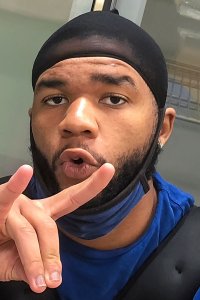Mutation Mastery
Ohio Wesleyan Student Researches How Bacteria Acquire Antibiotic Resistance

Name: Marquise Downing ’22
Hometown: Central Falls, Rhode Island
Major: Microbiology
OWU Connection Experience: Studying antibiotic resistance in salmonella
What I’m Researching
“I am working on antibiotic resistance in salmonella,” says Downing, explaining that he is exploring the topic by studying how bacteria adapt in response to a synthetic, broad-spectrum antibiotic called chloramphenicol.
“I am uncertain of the adaptations that have been made by the bacteria, but I’m certain they are interesting. Superbugs (antibiotic-resistant bacteria) are becoming an issue as fewer and fewer antibiotics are effective against them due to overuse.
“I hope to find out more about the mutations bacteria can develop in response to antibiotics. Maybe learning more can help us better deal with them. … I plan to present my findings at the Annual Biomedical Research Conference for Minority Students.”
My Most Eye-Opening Experiences
“How many things go wrong in research and that even the number of times I failed is nothing in comparison to what is generally expected,” Downing says of what he’s learned. “This has taught me I’m going to fail a lot in this career, but I guess it’s how I respond. Luckily my coaches have instilled that in me well.” (Downing is a member of the Battling Bishop football team.)
Lessons I’ve Learned
Among the lessons Downing has learned from his research, he says, is “how to make various kinds of media. I’ve learned different adaptations that I could see and have been learning how the bacteria are communicating, how the swarming mechanism happens (when the salmonella moves across the plate in unison), as well as many others.”
For the project, Downing is working with Kiley Dare Lewin, Ph.D., visiting assistant professor of Microbiology, and Laura Tuhela-Reuning, Ph.D., part-time professor of Botany-Microbiology and Zoology.
Professor Observations
Lewin, a 2006 OWU graduate, says: “The experiment Marquise is performing is a replication of that from the Kishony lab at Harvard Medical School. With the increased resistance of bacteria to antibiotics, it is important to understand how they evolve over time to gain the ability to resist antibiotic treatment. ...
“Marquise is using a large plate to grow the bacteria on media that has a gradient of antibiotic concentrations, lowest on both ends, increasing to a concentration 1,000 times the concentration the bacteria are normally able to survive,” Lewin continues. “As the bacteria grow on the plate, the only ones that will be able to move to the next area for nutrients are those that have spontaneously acquired a mutation that allows them to grow in an area with a higher antibiotic concentration.
“The goal is to study how these mutations are acquired … by completely sequencing the genetic information of the bacteria as they transition between a lower to a higher drug concentration,” Lewin says. “Marquise will take samples of the bacteria that spread to areas of the plate with higher antibiotic concentrations and isolate their DNA, which will be sent to a sequencing facility associated with another university. ...
“Once he has the data, he will be able to expand on what he learned in class about antibiotic resistance, to a molecular level by comparing the ‘evolved’ strains to the original bacterial strain to see which genes acquired mutations. … It will be interesting to see if he finds anything new, or if mutations occur in several different proteins,” Lewin concludes.
The Value of Mentors
“I have benefited in many ways from having Dr. Lewin, as well as Dr. Tuhela-Reuning (Dr. TR), as my mentor,” Downing says. “I would not have even had the idea for this project if it was not for (Dr. Lewin) and letting me have fun in the lab. Dr. Lewin has also been a really good resource in asking questions about the project, as well as Dr. TR.”
Why I Chose Ohio Wesleyan
“OWU was the only school in the nation that had (NCAA) Division III football as well as a Microbiology major.”
My Plans After Graduation
“I wish to continue my education and, hopefully, get my doctorate.”
